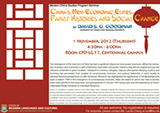
| News & Events |
| 1 November 2012 | |
Seminar: David S G Goodman Time: 4:30pm - 6:00pm |
|
The emergence of the new rich in China has had a significant impact on local power structures. While the interaction of politics and economics is well understood, local elites and power relations may also be shaped through the influence of families in given localities. Fieldwork in Lanzhou, Qingdao, Taiyuan, Zhongshan, Nanjing, Suzhou and Kunminghas proceeded from analysis of contemporary economic and political leadership in each locality to develop historical perspectives on elite formation. Research has highlighted the significance of family background back to before 1949 in the emergence of contemporary economic elites;the extent to which the new economic elites have parents in the party-state, and grandparents in the pre-1949 ruling class; and the importance of historically-based family narratives to individual behaviour. David S G Goodman is Academic Director of the China Studies Centre, University of Sydney; and Professor in the School of Social and Behavioural Sciences, Nanjing University. A graduate of the University of Manchester, Peking University, and the London School of Oriental and African Studies, his research concentrates on social and political change in China, particularly at the local level. Current projects include a study of China's current new economic elites (with Beatriz Carrillo and Minglu Chen); and an examination of relations between local elites and the CCP in North China during 1939-1940. Recent publications include (with Bryna Goodman) Twentieth Century Colonialism and China (Routledge 2012); (with Beatriz Carrillo) China's Peasants and Workers (Edward Elgar, 2012); and (with Minglu Chen) Middle Class China (Edward Elgar, 2013). He is currently completing Class and Social Stratification in China for publication by Polity Press in 2013. |
|
